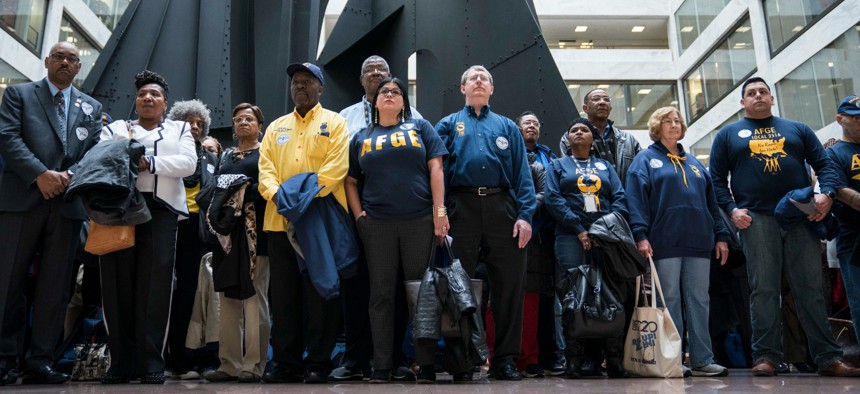House passes bill to prevent civil service overhauls without input from Congress

Members and supporters of the American Federation of Government Employees at the Hart Senate Office Building Atrium as part of the 2020 Legislative and Grassroots Mobilization Conference. The Preventing a Patronage System Act has the support of dozens of good government organizations and federal employee groups, including AFGE. Sarah Silbiger/Getty Image
Despite the support of more than 30 good government groups, Republicans remained largely opposed to the measure.
The House on Thursday voted 225-204 to pass legislation barring future presidents from unilaterally stripping federal workers of their civil service protections as former President Trump tried to do with his abortive establishment of Schedule F. Six Republican members voted in favor of the bill.
In October 2020, Trump signed an executive order establishing Schedule F, a new classification within the federal government’s excepted service, and instructed federal agencies to identify and transfer career federal workers in policy-related positions into the new job category, stripping them of their civil service protections and making them effectively at-will employees. But the administration was ultimately unable to implement the edict before Trump left office, and President Biden quickly rescinded the measure.
The Preventing a Patronage System Act (H.R. 302), introduced by Rep. Gerry Connolly, D-Va., blocks the president from reimplementing Schedule F, or any other new excepted schedule category of workers, without advanced congressional approval. The text of the bill already passed out of the House as part of the chamber’s version of the fiscal 2023 National Defense Authorization Act in July, and companion legislation was introduced in the Senate last month.
The renewed focus on the issue by congressional Democrats comes after reports that conservative activists and ex-Trump administration staffers have plans to immediately revive Schedule F under the next Republican president and have already identified 50,000 employees to threaten with termination. Trump, who is mulling another run at the White House, also explicitly endorsed the idea during a political rally last month.
The bill has the support of dozens of good government organizations and federal employee groups, including the National Active and Retired Federal Employees Association, the American Federation of Government Employees, the National Treasury Employees Union, the Senior Executives Association, Professional Managers Association, among others.
During debate on the House floor, Connolly said the bill would preserve both the federal workforce’s century-old merit system protections and reassert Congress’ authority as the maker of federal personnel policy.
“This bill does not preclude the president requesting to create a new job classification, but it does require [a request to Congress],” he said. “It restores the balance . . . Changing the nature of the civil service is rare and important, and it should require express congressional participation through legislation.”
Rep. James Comer, R-Ky., accused Democrats of wanting to entrench “bureaucrats” who are hostile to Republican policies and that Washington, D.C.-area support Connolly’s legislation because of the large numbers of federal employees in their district.
“This bureaucracy gets bigger every Congress,” he said. “I’ve noticed that with the exception of one speaker, all of the speakers on the other side of the aisle represent the Washington, D.C., federal bureaucracy workforce, but the majority of Congress, we represent America. Americans want to hold poor performing government employees, the bureaucrats who are paid with our hard earned tax dollars, accountable.”
Eighty-five percent of federal workers live and work outside of the Washington, D.C., region. Rep. Carolyn Maloney, D-N.Y., took exception to Comer’s characterization.
“I do not represent the Washington workforce, I represent New York City and the private sector, and I also represent taxpayers—a lot of them,” she said. “They want their money to be spent for good government, and they want the people in government to be impartial and dedicated to doing the best job possible without political influence. That’s exactly what this bill is about. Schedule F was never about removing employees who are performing poorly, and we removed over 10,000 federal employees last year. This is about protecting employees who are doing a good job from political influence.”



